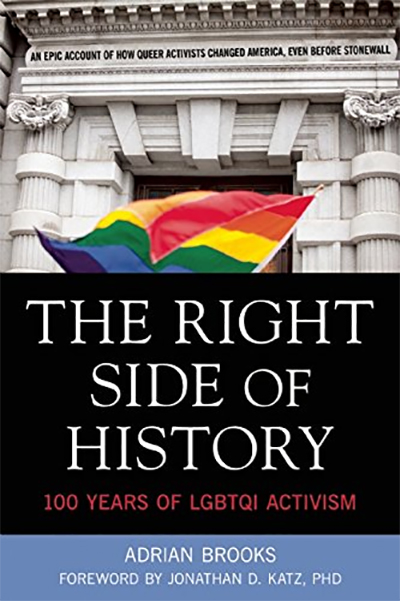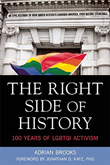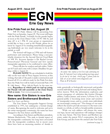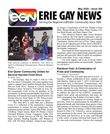Win The Right Side of History: 100 Years of LGBTQ Activism from Cleis Press!

Win The Right Side of History: 100 Years of LGBTQ Activism from Cleis Press! To enter the contest, fill out the form below between July 31 and August 21.
The Right Side of History: 100 Years of LGBTQ Activism
Author Adrian Brooks
Described by gay scholar Jonathan Katz as "willfully cacophonous, a chorus of voices untamed," The Right Side of History sets itself apart from all other histories and herstories by covering the period beginning with the freewheeling turn-of-the-century Bohemianism of Isadora Duncan and the 1924 establishment of the nation's first gay group—the Society for Human Rights; it also includes the organization and gay activism of labor unions in the 1920s and 1930s, the 1950s Civil Rights Movement, the 1960s anti-war protests, the sexual liberation movements of the 1970s (and more contemporary issues such as marriage equality), and queers at the forefront of contemporary peace and social justice movement, from antiwar protests to Palestinian rights. The book shows how LGBT and Intersex folk have always been in the forefront of progressive social evolution in the United States: artistically, spiritually, and politically. It references such celebrated heroes and heroines as Abraham Lincoln, Eleanor Roosevelt, Bayard Rustin, Harvey Milk, and Edie Windsor, all having played parts in the nation's steady advance towards full equality. Equally, the book honors those whose names aren't in history books, from participants in the Names Project (now a national phenomenon memorializing 94,000 people who have died of AIDS) to the current underground anonymous agitprop artists—Bay Area Queers Unleashing Power— who take their politics to the street. Among its many contributors are some of the pioneering voices in queer history itself.
"The Right Side of History is not an original work of historical scholarship. The essays, when they aren't first-person pieces or interviews, rely on secondary sources for most of their historical claims. However, as I was reading it I thought of myself as a twelve-year-old, and how I likely would have benefited enormously from having a copy of The Right Side pressed into my hands as a birthday or Christmas gift. I was the sort of child who voraciously read young peoples' biographical sketches of inspiring women of history (some of whom I now know were decidedly queer). This collection would have helped me see possibilities for myself in a similar way as those women-of-history collections did — helped me find language and historical context for longings I was just beginning to form. I suggest you consider this book for the queer, questioning, and just plain historically interested teenagers in your life; it's never too early to start peering through the windows of the past and considering how and where you might fit yourself." – thefeministlibrarian.com
"The Right Side of History's fundamental premise: Queer activism is an act of patriotism, and radical Queer activists are, and have always been, central to the struggle for a more perfect union. To read this book is to join our Queer ancestors as they dance, riot, write, organize, sew, sashay, and howl their way through American history."
–Katie Gilmartin, author of Blackmail, My Love
"It's good to know that there are still people like [Adrian Brooks] changing the world."
—David Mixner, civil rights activist and best-selling author of Brave Journeys: Profiles in Gay and Lesbian Courage
Adrian Brooks is an American writer and activist who's been the vanguard of progressive political, spiritual, and social movements since the 1960s. An international traveler, poet, performer, playwright, painter, and designer, he is also a novelist and nonfiction writer. Born in Philadelphia, Brooks was raised Quaker. After graduating Episcopal Academy in 1966 as an early hippie and anti-war protester, he attended Friends World Institute — a radical Quaker school intent on its students becoming nonviolent "agents of social change." In 1968 he volunteered for Martin Luther King in Washington, D.C. Following Dr. King's assassination, Brooks did field work in Mexico and East Africa before attending Woodstock in 1969, then went to India with the Friends World Institute. In the early 70s, he was active in New York's then radical SOHO Movement, then moved West where he became a prominent as one of the first gay liberation poets and as the scriptwriter and star performer of the legendary San Francisco "Angels of Light," an offshoot of the Cockettes. Brooks remains devoted to good works and activism to this day. He supports orphans and assists education in rural India and contributes to the Huffington Post as well as Lambda Literary. He lives in San Francisco.






